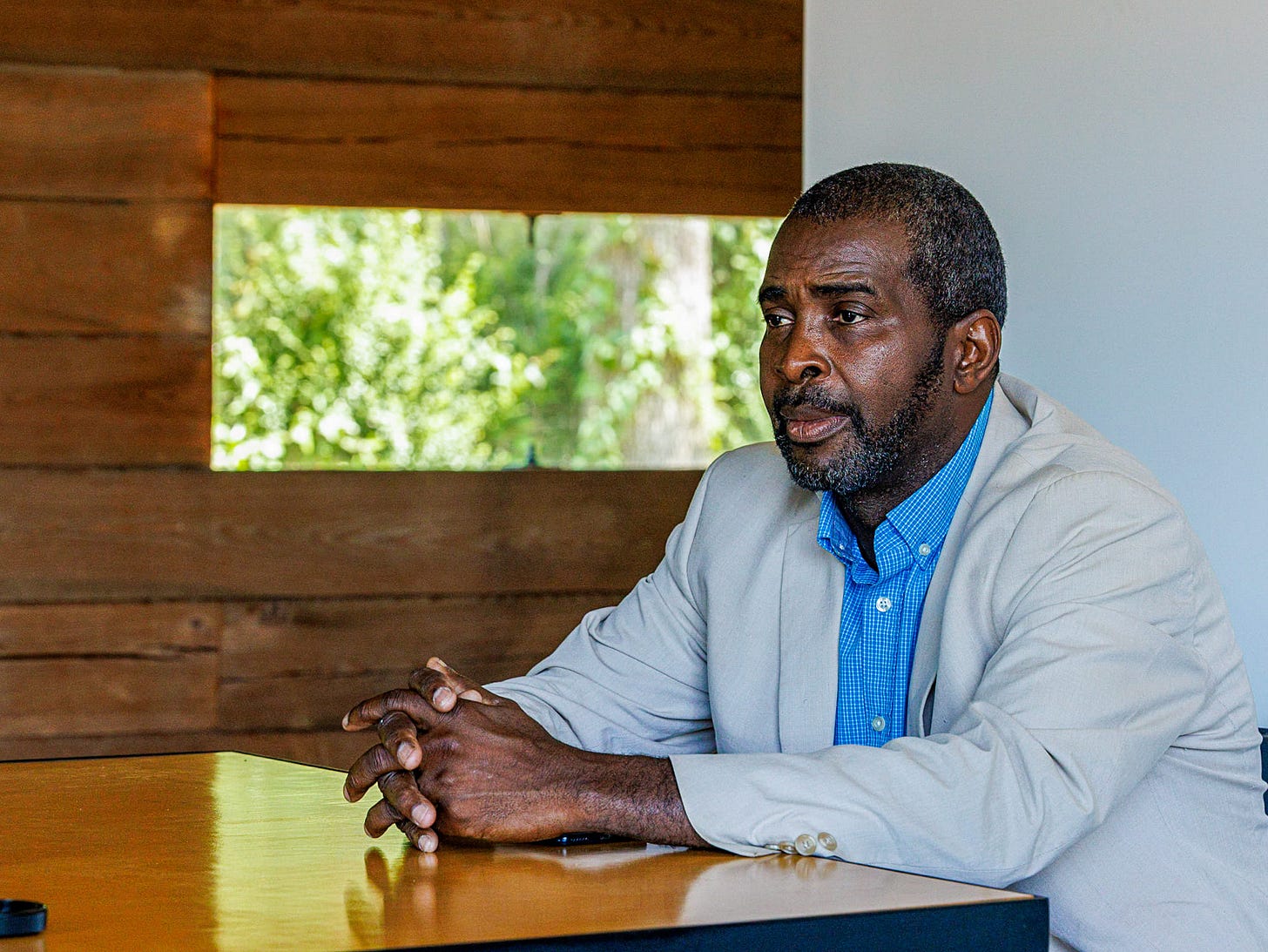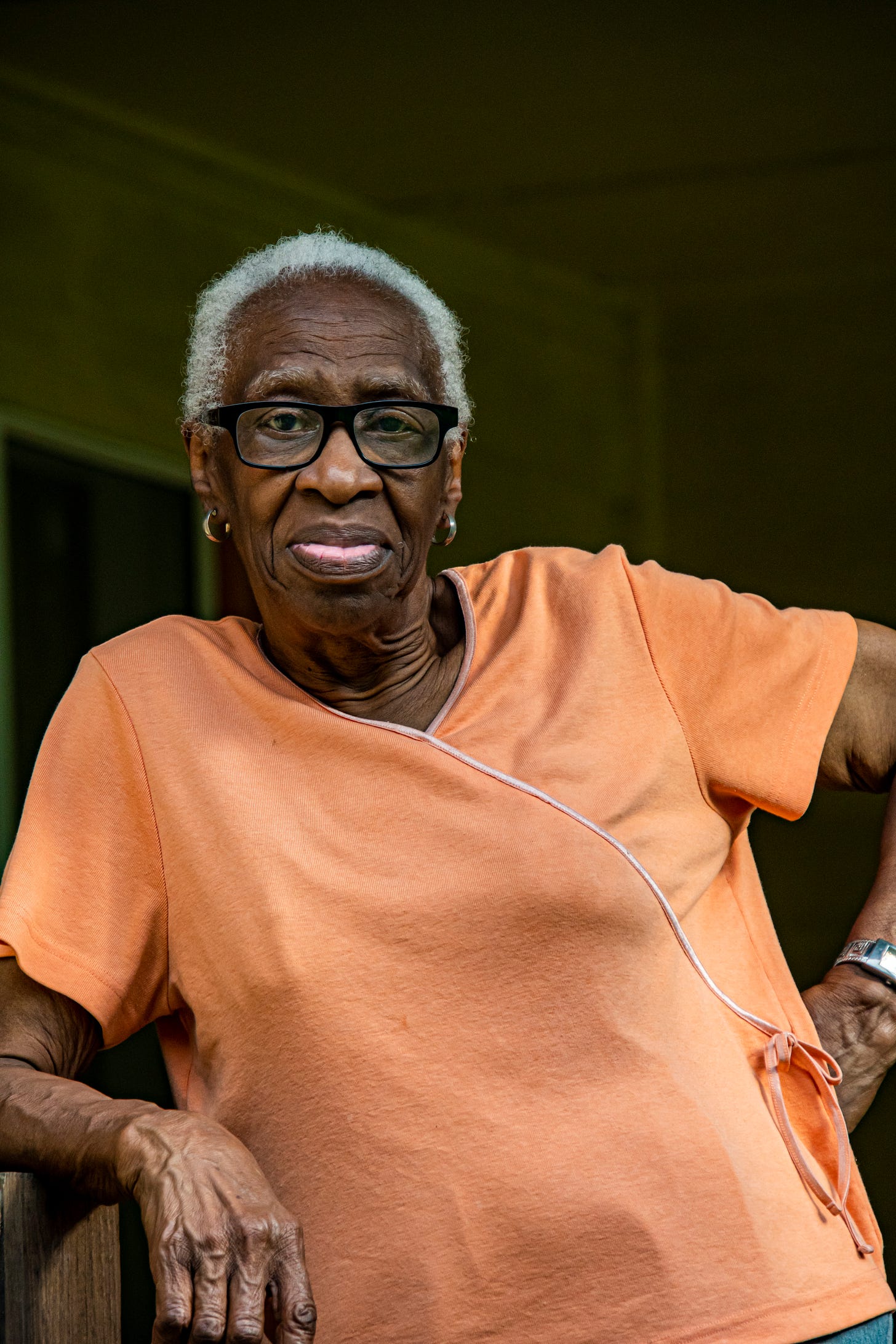He became the first Black mayor of Newbern, Alabama. A white minority locked him out of town hall.
Now, Mayor Patrick Braxton has filed a federal lawsuit he hopes will make things right.

Everyone in town knows the question, but they all have a different answer. Who is the mayor of Newbern, Alabama?
Todd McGilberry, owner of the Newbern Mercantile, one of the only businesses in town, answered the question Friday afternoon.
“I think Woody Stokes or Pat Braxton,” he said. “I don’t really know which one.”
He’s not alone.
Since 2020, Newbern — a majority Black, one-square mile town of just 275 people — has had two mayors. Or one. Or none. It depends on who you ask.
The confusion began in 2020 when Patrick Braxton became Newbern’s first Black mayor by operation of law. The town’s previous mayor, Haywood “Woody” Stokes III, had failed to file the necessary qualifying paperwork to run for the town’s top office. No citizens had filed to run for town council, either. Braxton, though, had taken great lengths to qualify. So without opposition, he assumed the office of mayor and, as had been the practice for years, appointed members of the town’s council — the first time Newbern had been represented by a body that reflected its majority-Black population.
Then the cogs of conspiracy, it seems, began to turn. Former members of the then-majority-white town council, members who had also failed to file qualifying paperwork, held what Braxton claims was an unpublicized, unlawful meeting to order a special election to fill their own seats. Only those present at the meeting knew about that decision, Braxton said, and were the only ones to “qualify” for the offices. After they “assumed office,” Braxton explained, they met again — without public notice — and appointed Stokes as mayor.
Now, nearly three years into his term, Braxton is still unable to discharge the duties of his office. In a federal civil rights lawsuit, Braxton claims that since he became mayor of Newbern, former Mayor Stokes and others have participated in an illegal conspiracy to prevent him from “governing the affairs of the town” simply because of his race. That conspiracy, Braxton argues, violates federal law and the U.S. Constitution’s Equal Protection Clause.
In their response to the lawsuit, Stokes and the purported members of the town council deny any wrongdoing. Braxton and the members of the town council, the defendants claim, “will be unable to prove” a conspiracy took place. The defendants, too, claim immunity from the suit, arguing that the law in situations like this was not “clearly established.”

A town without a vote
On one thing, everyone in Newbern agrees. Black or white, plaintiff or defendant, young or old, no one in Newbern can remember an election.
“I can’t remember one,” one middle-aged Black resident told Tread Saturday morning. She shucked corn on her front porch as she answered questions. “You’ll have to ask some of the older folks.”
The older folks don’t remember an election, either.
Hattie Hollis, 83, was born and raised in Newbern. She couldn’t recall a single election in the town’s history.
“Not that I know of,” she said. “I can’t remember any election.”
Even the former mayor and his co-defendants admit it’s been decades since the citizens of Newbern have been able to vote for the town’s leader.
"For 60 years the Town of Newbern, Alabama, a one square mile town, has not held elections,” lawyers for Stokes wrote in a court filing. “The title of Mayor has simply been passed from individual to individual to anyone who would agree to be Mayor without regard to elections. Mayor Stokes became the Mayor of the Town of Newbern in this manner.”
In an interview with Rev. Michael Malcom conducted last year, Mayor Braxton said there haven’t been elections in Newbern for one simple reason — its citizens haven’t felt that democracy was a realistic possibility.
“They didn’t even know they could vote for mayor,” Braxton said. The position was always handed down from white man to white man, he explained, and when the time would come for an election, no notices would be posted informing Newbern residents that an election was even possible.
“It was always just passed from one friend to another,” Braxton said.
Chavonne Calhoun, 43, has lived in Newbern her whole life. Her view of the town’s lack of elections mirrored Braxton’s.
Calhoun, a Black woman, said it’s difficult for folks in Newbern who are struggling to just get by have been unwilling to take up the fight that would inevitably come from challenging the white minority’s grip on the reins of the town’s government.
“A lot of Blacks knew there was no point,” Calhoun told Tread. “It’s really no point in wasting your time.”
A meeting at the mercantile and the election that never was
For Patrick Braxton, it all began with the flags.
For years, he’d wondered why the town had never tried to commemorate national and state holidays. Maybe a few American flags for July 4th or Veteran’s Day, he thought, or decorations for Christmas or Easter.
Braxton took it upon himself to buy 72 flags and began hanging them up for holidays when he could. And he also began to think more deeply about why there was so little leadership in the town.
“So I approached the former mayor over there in the mercantile one morning and told him I need some paperwork — I want to run for mayor,” Braxton explained.
“We’ve never had an election out here… We don’t have ballots and machines to do it.”
Stokes’ response, according to Braxton, was less than enthusiastic.
“We’ve never had an election out here,” Braxton recalled Stokes telling him. “We don’t have ballots and machines to do it.”
It was then, Braxton said, that he knew he’d encounter resistance to his desire to secure an election for his hometown.

It wasn’t until he travelled to Greensboro, the county seat, that Braxton would be given all the appropriate paperwork and a straightforward explanation of the process of qualifying to run for mayor of Newbern.
It was a process, Braxton said, that he followed carefully. He filed the necessary paperwork. He paid the qualifying fee.
Stokes, on the other hand, did not file the appropriate paperwork to qualify for the office of mayor, a reality Stokes has admitted in court filings. Stokes did not respond to requests for an interview or a comment on this story by publication time.
So in November 2020, Mayor Patrick Braxton was sworn in as the town’s top public official. As had been the practice in the town for years, Braxton soon followed up by appointing members to the town council — a council for which no one had qualified in the previous election. His appointments of James Ballard, Barbara Patrick, Janice Quarles, and Wanda Scott constituted the first majority-Black council in Newbern history.
Meanwhile, the town’s former council members — Gary Broussard, Jesse Leverett, Voncille Thomas, and Willie Tucker — have said they were “informed that Town Council membership must be by election,” a notification that contradicted the pratice of the town for decades. The codefendants did not specify who notified them of the alleged requirement, when, or by what method.
“The former Council Defendants then undertook overt actions in aid of the conspiracy to prevent Braxton from being able to exercise the powers of the office of Mayor and from allowing the appointed majority black Town Council to exercise the powers of council members,” Braxton’s federal lawsuit claims.
The former council members admit to having called a special election, but only once, they said, they were notified it was a legal requirement. Braxton said neither he nor the town’s citizens were notified of the special election — an election to choose members of a council already filled by Braxton’s appointees. No resident interviewed by Tread was aware of the special election.
After Braxton refused to attend meetings held by the former council members, the codefendants claim, Braxton “lost the mayorship by operation of law.”
Then came the kicker.
“…The truly elected Town Council appointed Haywood Stokes, III as Mayor,” the codefendants wrote in a court filing.
At this point, Braxton was even locked out of the town hall, and in the time since, he’s been unable to discharge his duties as mayor.

Because of the defendants’ conspiracy, Braxton said that even the man who cuts the grass on town property knows more than he does about the town’s internal operation.
“I asked him several times, ‘Who told you to cut the grass?’” Braxton explained.
“I’m doing what the mayor told me,” the man responded, according to Braxton.
“I haven’t told you nothing,” the mayor replied. “Who’s the mayor?”
The answer still rings in Braxton’s ears: “Mr. Stokes.”
Who’s the mayor of Newbern?
For State Sen. Bobby Singleton, there’s never been a question.
“Braxton is the mayor,” Singleton told Tread without hesitation. Singleton, the minority leader in the Alabama Senate, represents Newbern and much of Alabama’s Black belt.
“It’s just been the old, powerful slavehands that was on Black folks’ neck in that community. That mentality is still there.”
The senator, a political powerhouse in the state, said there’s no doubt that the effort to oust Braxton is motivated by race — an effort to continue allowing the passage of power from one white mayor to another.
“It’s just been the old, powerful slavehands that was on Black folks’ neck in that community,” Singleton said. “That mentality is still there.”
Federal records of slaveowners in the area show that Stokes’ ancestor Peter P. Stokes enslaved at least five individuals — three men and two women, ranging in age from 8 to 30 — and also served in the Confederate Army. Records of the names of enslaved individuals did not typically appear in the U.S. Census, but in the first count after the Civil War, many of the Black individuals listed in the area were Braxtons.
According to Singleton, Stokes’ effort to oust Braxton and Black town councilors is a violation of the citizens of Newbern’s constitutional right to vote.
“Mr. Braxton is the mayor, and he should be declared the official mayor,” Singleton told Tread. “And the town of Newbern should be held in contempt for not being able to hold free and fair elections in terms of violating these people’s right to vote.

Rep. Curtis Travis, who represents the community in the Alabama House, agreed with Singleton’s assessment in an interview with Tread.
“I think the community deserves representation — a choice,” Travis said. “The only fair way to represent people is to actually have elections.”
Alabama’s Secretary of State’s office, the agency charged with overseeing elections, did not respond to requests for comment on this story. Former Secretary of State John Merrill said he was not made aware of the controversy of Newbern’s mayorship during his time in office.
The Alabama League of Municipalities, an association that bills itself as the “recognized voice of Alabama’s cities and towns” and of which Newbern is a member, would not comment directly on the situation. Mayor Braxton said, however, that the league’s lawyer “coached” the former mayor and town council members on how to oust him from office.
It’s a charge that Lori Lein, the league’s general counsel, did not dispute in her response to questions from Tread.
“To the extent that we can we educate the public on the nuances of municipal law, we are happy to do so. The Newbern situation presents a very complicated set of facts involving many layers of Alabama’s municipal laws from election laws, laws regarding automatic removal from office and laws relating to the proper steps for filling vacancies. However, because we are not a state agency but rather an association made up of our member municipalities, including Newbern, I am not able to comment on the current status of the litigation that has been filed.” -Lori Lein
Every Black resident of Newbern interviewed by Tread said they believe elections should be regularly held for mayor.
“It’s time for new people to take office,” Chavonne Calhoun told Tread.
She said she knows who Patrick Braxton is simply because he’s always been willing to help those in need in Newbern.
“Mr. Pat is a big influence in this community,” she said. “When my dad died, he came out and helped tremendously. When you need a helping hand, he’s the first one to help you out — no questions asked.”
Calhoun said she’d never met or heard from Woody Stokes.
But there are many issues, Calhoun said, that need to be addressed in the town. Calhoun commutes 25 miles every day to get to her job at Walmart in Demopolis, Alabama. Newbern needs jobs, Calhoun said, and she hasn’t seen any progress in the decades she’s lived there.
“I haven’t seen anything the old mayor did,” she said. “There’s no been no kind of help for people.”
83-year-old Hattie Hollis said that she, too, thinks elections should be a regular occurence in Newbern. After graduating from high school in Hale County, Hollis moved to Cleveland and worked on an assembly line placing batteries in hearing aids for more than three decades. She always promised herself that when she retired, she’d make her way back to Newbern — “it’s home,” she said. She was able to keep that promise.
But Hollis said that in the decades since she left Newbern in her late teens, the conditions in the town have gotten worse, not better. She and other citizens in the town don’t want much, she explained, just basic services and someone willing to lend a listening ear.
“We just don’t want to be dismissed,” Hollis said. “I’d like to just see things get done. I want us to be a community — together.
Aside from Newbern Mercantile’s owner, who said he prefers to remain “neutral” on the issue, no white citizen of Newbern approached by Tread would comment for this story.
On Friday, a half dozen white residents sat on the porch of a plantation-style home on the Newbern’s main drag. Several young people sat in chairs and a bearded, older white man stood guard at the stairs. The subject of the story at hand was simple, Tread explained: “Who’s the mayor of Newbern?”
A young woman sitting on the porch couldn’t help herself.
“That’s a great question,” she blurted out.
The man at the stairs whipped his head around at her, unimpressed. Asked if anyone would like to talk about the controversy, the man didn’t hesitate for a second.
“Absolutely not,” he said.










We live in the South, yet it's hard to believe some people can still act this way. Best wishes to Mr. Braxton in his efforts.
Thank you for opening yet another window into the blatant bigotry in this state. Why the H-E-double hockeysticks did I move here? Because all the family I have left is 10 minutes from my house, but still. I join Mayor Braxton in his hopes for a positive outcome for himself and his community. Please post updates.